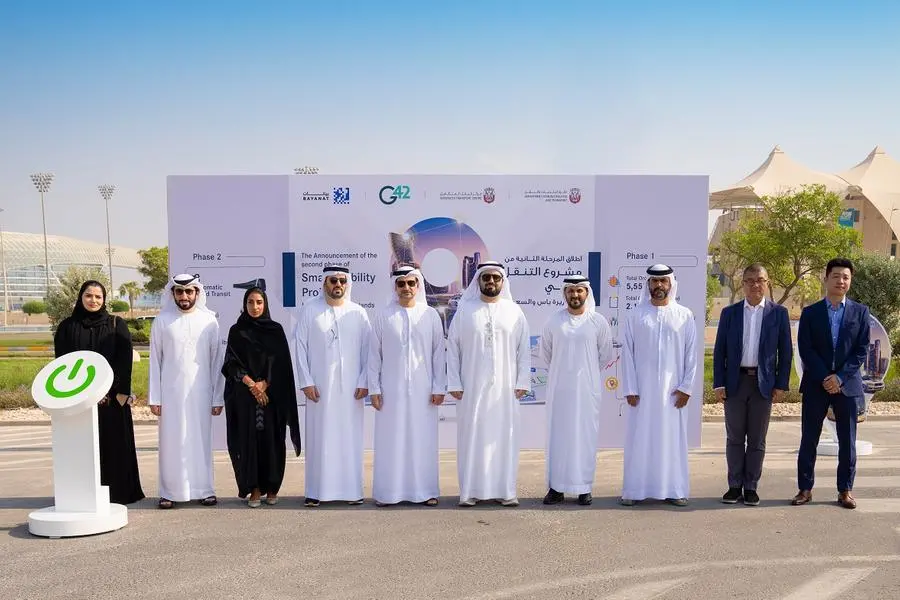PHOTO
Abu Dhabi: In line with the vision of our wise leadership that aspiring to make Abu Dhabi’s cities smarter while contributing to its sustainability, and as part of its efforts to build a smart transport system that supports development across its various sectors and facilitates the mobility of its residents and visitors, the Integrated Transport Centre (ITC) of the Department of Municipalities and Transport (DMT) in Abu Dhabi has therefore announced the launch of the second phase of the smart transport project in Yas Island and Saadiyat Island.
The smart transport project is conducted in collaboration between the ITC and Bayanat, a G42 company that specializes in AI-powered geospatial intelligence.
The Integrated Transport Centre stated that this project is a part of Abu Dhabi’s smart transport strategy to adopt smart and sustainable transport solutions based on knowledge and innovation, which reinforces the efforts to develop cities that are in line with our future vision and achieves sustainable development in the emirate. The DMT and the ITC, along with their strategic partners in both government and private sectors, are working towards establishing a smart, integrated and sustainable transport system, striving for realizing the aspirations of our wise leadership and their futuristic vision.
The ITC also stated that smart transport sets the scene for a new stage of developing an environment-friendly and sustainable transport sector, which encourages more investment in the economy and tourism, especially as the transport sector is one of the most important drivers of growth that supports businesses and adds to the competitive advantage for economic activities in many other sectors.
The smart transport project in Yas Island and Saadiyat Island currently includes a fleet of eight “TAXI” autonomous vehicles, the first fully automated self-driving taxis in the UAE, which were launched last May. It also includes four mini Robo buses, which were added to the local transport services in June, in addition to 15 new charging stations added this month in Yas Island and Saadiyat Island. Furthermore, the Automatic Rapid Transit (ART) will operate in November in Yas Island and Saadiyat Island. This would be conducted while reinforcing the operational capabilities of Abu Dhabi's “Digital Twin” system, that includes building an integrated system serving as a basis for advanced digital simulations and providing support services and technical infrastructure services with operational and technical support supplied by the cloud computing system T100, which in turn facilitates the storage and processing of data through integrated operating systems.
Eng. Hasan Al Hosani, CEO of Bayanat, stated that “The first phase of the project in Yas Island was of resounding success, reflecting the positive impact that artificial intelligence-supported spatial and geospatial data has on our daily activities and lives. The move to the second phase of the project represents a milestone in the digital transformation of the transport sector in Abu Dhabi. We have increased the size of the fleet and implemented the Automatic Rapid Transit (ART) system, in addition to geographical expansion of operational areas. We are also excited to begin the second phase in cooperation with the Integrated Transport Centre, thereby contributing to the development of smart and sustainable cities, that are in line with the aspirations of the UAE’s wise leadership.”
On the other hand, the ITC announced that the second phase of the project would be launched prior to hosting the Formula 1 Etihad Airways Grand Prix at Yas Marina Circuit in November, one of the world's largest sporting and entertainment events, which strengthens Abu Dhabi's status as a host of major global sporting events. The ITC also added that the project will provide a distinctive and efficient integrated transportation experience for visitors to the event, facilitating transport to and from the race venue and providing new routes that will alleviate traffic congestion through the use of smart transport buses, smart taxis, and the introduction of the Automatic Rapid Transit (ART).
It is worth noting that Abu Dhabi's smart digitalization strategy aims at developing an effective and sustainable transport sector that utilizes modern technology to better serve the community by increasing efficiency in the transport system and supporting the transition to smart autonomous vehicles which are both eco-friendly and sustainable. Advantages of the strategy include reducing the cost of transport and enhancing the quality of life in the Emirate of Abu Dhabi, thus promoting its global position as one of the finest destinations to live and work and invest. The strategy also contributes to achieving the UAE’s Sustainable Development Goals, reducing carbon emissions in line with the Paris Agreement of COP 21 and the UAE Net Zero 2050 vision.



















